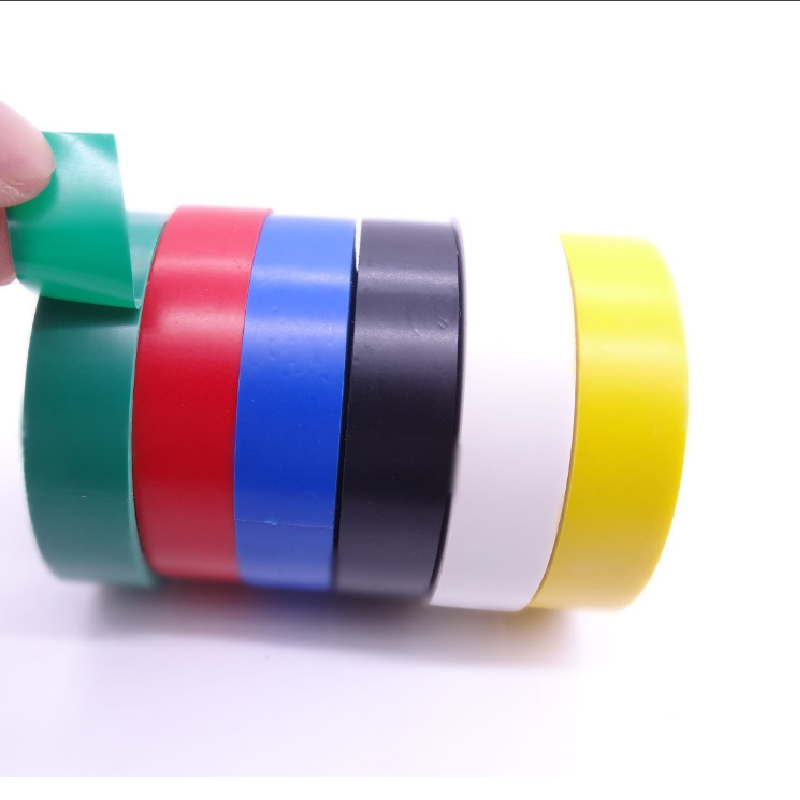Understanding the Different Types of Insulation Tape
Insulation tape plays a crucial role in electrical applications, ensuring safety and functionality by preventing electrical leakage, protecting wires, and maintaining proper insulation. With a variety of types available, each tailored to specific needs, it's essential to understand the characteristics and applications of different insulation tapes to make the right choice for your project. Here we will delve into the most common types of insulation tape and their uses.
1. PVC Insulation Tape
PVC (Polyvinyl Chloride) insulation tape is one of the most commonly used types. It is well-known for its versatility, durability, and resistance to abrasion and moisture. PVC tape is available in various colors, which can be used for color-coding electrical wires, aiding in easier identification. This type of tape is commonly used in electrical wiring applications, for bundling wires, and as a protective wrap against environmental factors. PVC insulation tape typically has a temperature rating of around 80°C, making it suitable for most household and industrial electrical projects.
2. Vinyl Electrical Tape
Similar to PVC tape, vinyl electrical tape offers excellent insulating properties and is also a popular choice among electricians. It is made from a stretchy, flexible material that allows for a secure fit around wires and connectors. Vinyl electrical tape is designed to adhere well to a variety of surfaces and can withstand higher temperatures, up to 105°C, making it ideal for use in high-heat applications. Additionally, its high resistance to UV rays and moisture makes it suitable for both indoor and outdoor use.
Rubber insulation tape is made from high-quality rubber, which provides exceptional electrical and thermal insulation. This type of tape is particularly effective in applications requiring a high degree of stretch and flexibility. With good elongation properties, rubber tape can conform to irregular surfaces, ensuring a tight seal that prevents moisture ingress. It’s commonly used in splicing and insulation of electrical cables and is ideal for heavy-duty applications. Rubber insulation tape can typically withstand temperatures between -40°C to +90°C.
insulation tape types

4. Foil Insulation Tape
Foil insulation tape, often made from aluminum foil, possesses excellent heat-resistance qualities and is usually used in applications involving thermal insulation. Its reflectivity makes it ideal for reducing heat loss in ductwork and insulation systems. The tape is often used in HVAC systems to seal and insulate duct seams and connections, thereby enhancing energy efficiency. Furthermore, foil insulation tape has a strong adhesive backing, providing a reliable seal that is resistant to moisture and various chemicals.
5. Self-Fusing Silicone Tape
One of the unique features of self-fusing silicone tape is that it doesn't have an adhesive backing. Instead, it bonds to itself when stretched and wrapped around surfaces. This type of tape is highly resistant to heat, cold, and moisture, making it perfect for outdoor and high-stress applications. It can withstand temperatures of up to 260°C and provides excellent electrical insulation. Self-fusing silicone tape is often used in emergency repairs, such as wrapping damaged hoses or insulating electrical connections.
6. Teflon Tape
Commonly known for plumber's tape, Teflon tape is also utilized in electrical applications, primarily for its electrical insulating properties. While it's not commonly used for direct electrical insulation like other tapes, it's often used to wrap threaded connections, preventing leaks and ensuring a good mechanical bond. Teflon tape can resist high temperatures and is chemically inert, which makes it suitable for specialized electrical applications and environments.
Conclusion
Choosing the right type of insulation tape is critical for ensuring the safety and effectiveness of electrical installations. Each type of insulation tape has its own unique properties and applications, making it essential for professionals and DIY enthusiasts to understand these differences. Whether it’s PVC, vinyl, rubber, foil, self-fusing silicone, or Teflon tape, the right insulation tape can make a significant difference in the longevity and reliability of your electrical systems. Always consider the specific requirements of your project before selecting an insulation tape to ensure optimal results.
-
XIANGFAN Rubber Tape-Ultimate Solutions for All Your Insulation NeedsNewsJun.24,2025
-
XIANGFAN Rubber Tape-Protection for Industrial and Residential ApplicationsNewsJun.24,2025
-
XIANGFAN Rubber Tape: Superior Safety and Sealing for Demanding EnvironmentsNewsJun.24,2025
-
XIANGFAN Rubber Tape: Reliable Solutions for Every Electrical ChallengeNewsJun.24,2025
-
XIANGFAN Electrical & Industrial Tape: Powering Reliability Across IndustriesNewsJun.24,2025
-
XIANGFAN Electrical & Industrial Tape: Excellence in Every ApplicationNewsJun.24,2025
